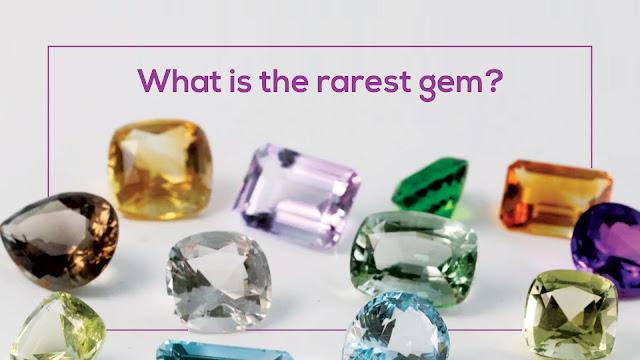What is the rarest gem?
Gemstones are a real wonder on this
planet that forming over millions and billions of years in the Earth's crust.
Diamonds, rubies, sapphires, and emeralds are the four rarest gems in the world, although there are more than 200 types of
gemstones known to man. According to the known quantities of gemstones in the
world, there are some gems that are at least a thousand to a million times
rarer than the average gem. Even the most sought-after gems in the world pale
in comparison to their value. They're all one-of-a-kind, making them extremely
rare. The following are five of the world's most rare gems, each with its own
special characteristics.
What are the Rarest Gemstones in the World?
Tanzanite: Tanzanite was discovered in
Tanzania, Africa, in 1967, and has since found its way into the jewelry market.
When viewed from various angles, it exhibits superb trichroism, making it one
of the rarest gems on the planet. Blue, violet, and burgundy are the primary
colors in Tanzanite. Tanzanite, on the other hand, is extremely rare due to its
extreme scarcity. Only one mine in the globe, which is 7 kilometers long and 2
kilometers wide, is predicted to be exhausted in the next 30 years.
Red Beryl: An emerald-like mineral, Red
Beryl was discovered in the Wah Mountains of Utah, and it shares the same
family as aquamarine. Red Beryl is unusual in that it is found in such large
quantities, even if the majority of the material is of lower quality. Only a
small percentage of the best-quality stones are good enough to be cut and used
as gemstones. However, because they are rarely faceted, they make excellent
collectibles. One in every 150,000 Red Beryl crystals is gem-quality.
Black Opal: A black opal's diffraction of light and
color play causes it to seem creamy-white on the outside, with an explosion of
color on the inside. White, grey, and green are the most common colors of opals
seen in nature. The black Opal, which can only be discovered in Australia, is
the most elusive. The Northern Lights are eerily reminiscent of the colors on
the black background. About $763,000 was paid for one of the most precious
black opals ever found.
Alexandrite: "Emerald by day, ruby
by night" is a well-known nickname for Alexandrite, a gemstone that
changes color depending on the intensity of the light. Alexandrite exhibits a
blue to green coloration in direct sunlight, but a red to purple hue under
shadowy conditions. It was named after Czar Alexander II, then-next-in-line
Russian Emperor, after his 1830 Ural-mountain discovery. Only a few mines in
Brazil and Russia still have access to this extremely rare metal, which was
originally discovered in Russia but depleted within a few decades of its
discovery.
Painite: Painite is the world's
rarest mineral and gemstone, according to the Guinness Book of Records. There
were just two examples of Painite for many decades after its discovery in 1951
and there were only a few dozen known gemstones in 2004. In spite of the recent
development of two dedicated mines in Myanmar, the world's supply of painite
gemstones is still less than 1,000, most of which are not cut.
Gemstones are a novelty in today's
society and being this uncommon is sure to give these jewels the admiration
they deserve. Gemstones are highly valued for their individuality, and KGK gemstone suppliers is proud to be
one of the top 10 jewelry makers in the world. Contact KGK Group to speak with an expert if you're looking for the highest
quality gemstones for your jewelry.




Comments
Post a Comment